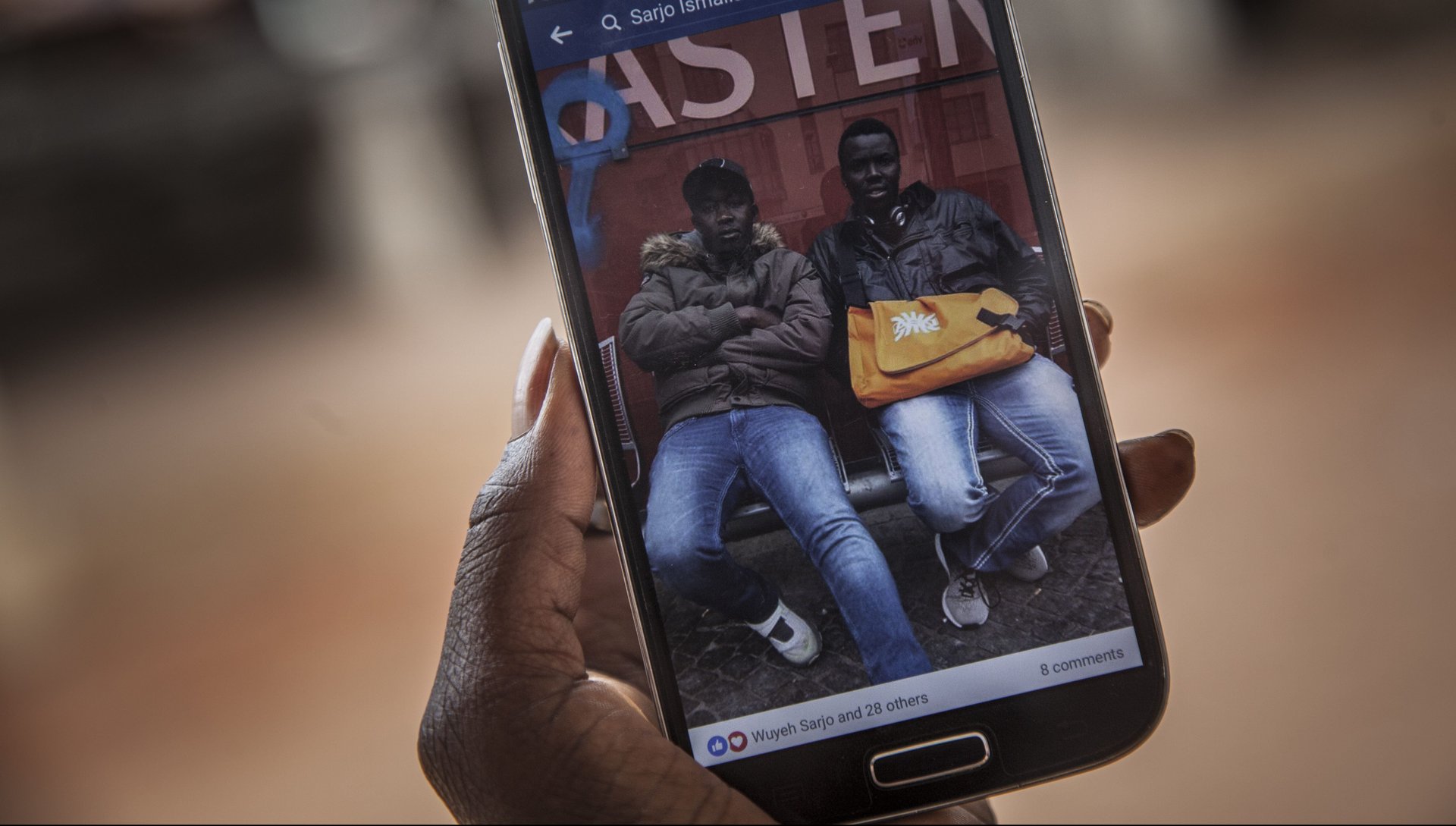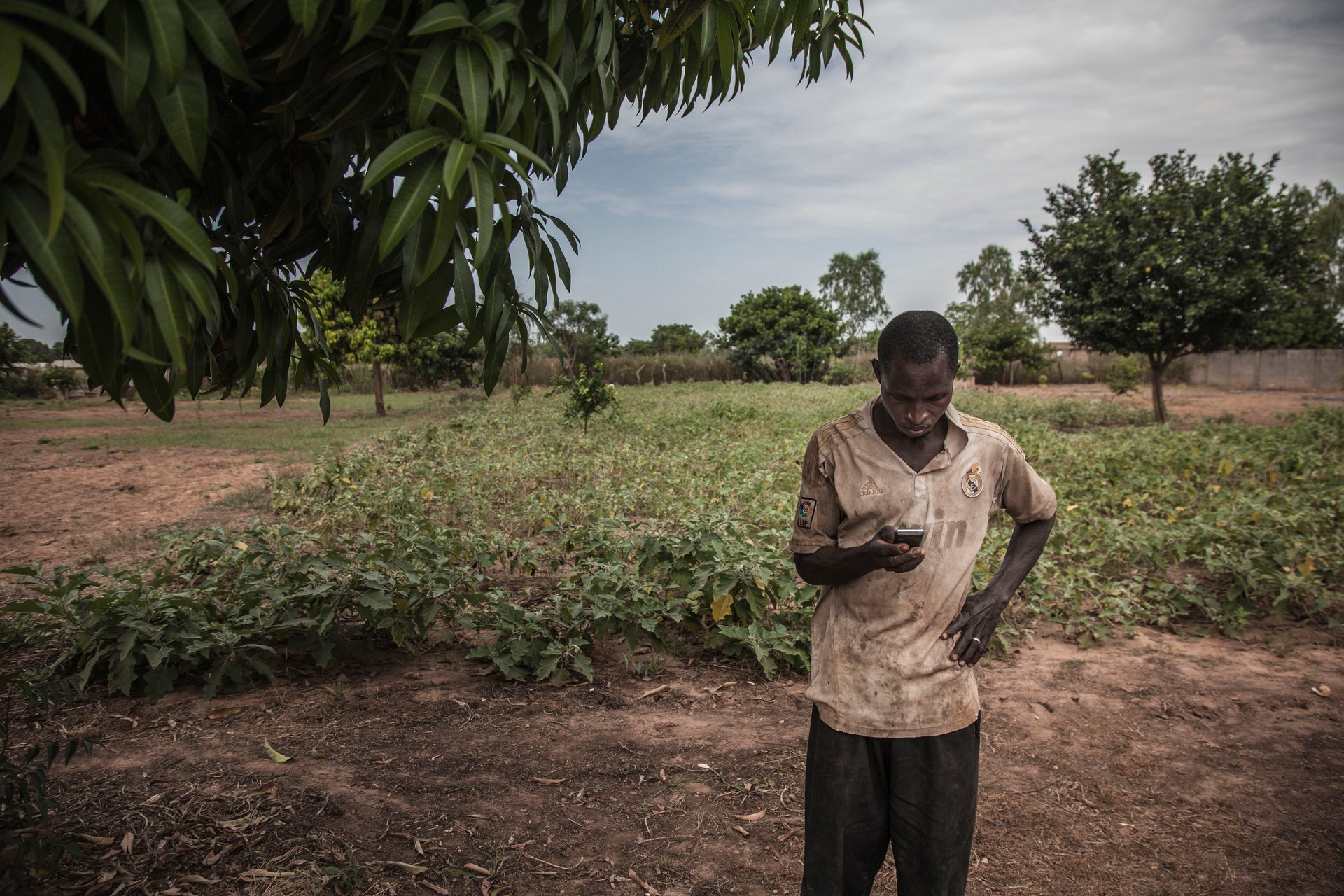Young Gambians are risking their lives to chase a European dream they see on Facebook
Mandinaba, Gambia


Mandinaba, Gambia
At his 12-acre farm school in western Gambia, Ousman Manneh teaches students how to cultivate everything from sweet mandarin trees through to sturdy cross-bred goats. Yet no matter what riches can be raised on Gambia’s ochre-red soil, he knows some of his students may decide that better pastures lie elsewhere.
Manneh, 36, works for a government program to discourage locals from trying to leave for Europe by teaching them better farming skills. But he faces many challenges—one of which can be heard in the background as he sits lecturing his students.
Cutting in every so often through the sound of birdsong and goat bleats is the ring of smartphones – which, these days, nearly everyone in Mandinaba can afford.
Backed by a cellphone network that is better than any other local infrastructure—water round here is still pumped from wells—villagers can surf the web as easily as in Europe, keeping up with friends and family by social media.
And there, for Gambia’s government, is the problem. In the old days, those who took the Back Way tended to be largely incommunicado once they reached Europe. Today, they remain constantly in touch—bombarding Mandinaba with images of what invariably looks a richer, happier world.
“People always think life will be better in Europe,” says Manneh, as he sat with three pupils in the shade of a tree. “Speaking personally, though, I wouldn’t want to be an illegal migrant anywhere. It it is better to be a farmer here than to take the Back Way.”

The Back Way, as it’s known in The Gambia, is the nickname for the perilous route to Europe tried by those Africans who know they stand no chance of ever getting a visa through offical means. First they travel by bus to the desert city of Agadez in Niger. Then it’s a people-smuggler’s lorry across the Sahara to Libya, and a rickety inflatable boat across the Mediterranean. In practice, that journey is even much more complicated and perilous than it sounds.
This year, Gambians made up 7% of the 130,000 arrivals from Libya, according to the UNHCR—making the tiny nation of 1.9 millions one of Africa’s biggest per capita people exporters. Some say they are fleeing human rights abuses by Gambia’s despotic ruler, Yahya Jammeh, but the vast majority are simply economic migrants, fleeing a land where average incomes are just $1.25 a day.
Yet just as migration has become a major issue in Europe, so too is it now causing alarm here, for the very opposite reason. In villages like Mandinaba, where Manneh farms, at least 50 young able-bodied men of the 2,000 residents are believed to have taken the Back Way in recent years. If it continues at this pace, the fear is that there may soon be no young men left to bring in the harvests.
“People migrate for many reasons, but one is the expectations created by mobile phone technology,” said Lamin Darboe, executive director of Gambia’s National Youth Council, which runs “No to the Back Way” educational programs.
“But it tends to show only the best side of things—the affluence, the freedom, the goodies of Europe. People don’t see the downside, like having to live in a refugee camp, or sleeping on the streets.”
Arguably the biggest distorters of the picture are the people who take the Back Way themselves. Those who do find success will all too happily boast online, knowing that the money they wire back for school fees or new homes can make them heroes in their villages. Those who languish in refugee camps or on the streets are often rather coyer, for fear of being seen as a failure back home.
“The photos people post always show them in nice shopping malls, or dressed in smart suits,” said Tida Jallow, who owns her own fashion boutique in Mandinaba, as she scrolled through Facebook posts on her phone from villagers who had taken the Back Way. “It’s always pictures that makes them look good, but you never really know how they’re doing.”
Jallow, 31, is also involved with the government’s anti-Back Way program, training villagers in the art of tailoring. Four of her apprentices, though, have taken the Back Way themselves, as did her half-brother after she trained him as a salesman. He later died in Libya.
Hip hop dreams
Such tragedies do not happen for lack of warnings. Two years ago, the US embassy in Gambia even sponsored a “No to Backway” concert, in which local rappers sang about the temptations—and the risks—of illegal migration.
As one rapper, Bro K, put it: “My only friend is going to Europe, he builds a nice house, has nice cars, and lots of women following him. Then I also want to go.”
Right now, though, there seems little chance of an end to the exodus. President Jammeh, who stands accused of killing and jailing scores of critics, agreed to step down earlier this month after an unexpected defeat in elections by Adama Barrow. Last weekend, though, Jammeh declared that he no longer accepted the election results, in what was widely seen as an attempt to cling to power.
Yet even if he does end up going quietly, nobody expects the Back Way to shut for business overnight. “The intimidation under Jammeh will soon be over, but many people are leaving for economic reasons,” Barrow’s spokesman, Lamin Cham, told Quartz. “That will take time to solve.”
Indeed, in places like Mandinaba, it may take more than just time. For despite the farming classes, many locals simply do not want to live off the land as their forefathers did—especially not when Facebook shows the glamour of life in a Western city.
For them, no amount of rap songs about the Back Way’s risks or better farming programs are likely to be much deterrent.